One of my weird pop culture obsessions is the degree to which movies acknowledge the existence of “real-life” pop culture–movies, TV, music, etc.–within their own universes. It all started with the movie Inception, which prominently features a piece of pop music (“Je ne regrette rien” by Edith Piaf) but doesn’t make any references to popular movies about the dream vs. reality divide (e.g., Total Recall, The Matrix).
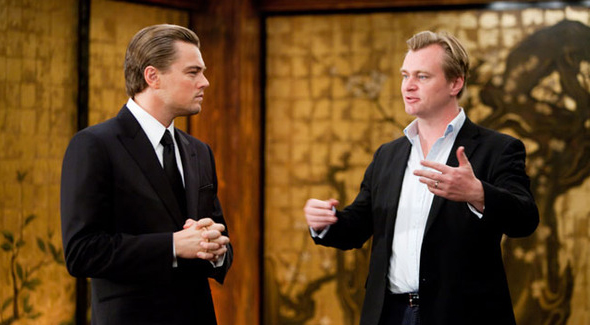
“Leo, for inspiration in this scene, imagine how Arnold felt after ‘divorcing’ Sharon Stone in ‘Total Recall.'”
A few more examples:
Zombieland acknowledges the collective film output of Bill Murray, including Ghostbusters, but none of the characters seem to have ever seen a zombie movie.

The Garfield movie was not a zombie movie, even though it may make you feel dead inside after watching it.
In the first Tobey Macguire Spider-Man movie, Aunt May makes a brief reference to Superman, but aside from that, no other superheroes are mentioned as either real people or fictional characters.
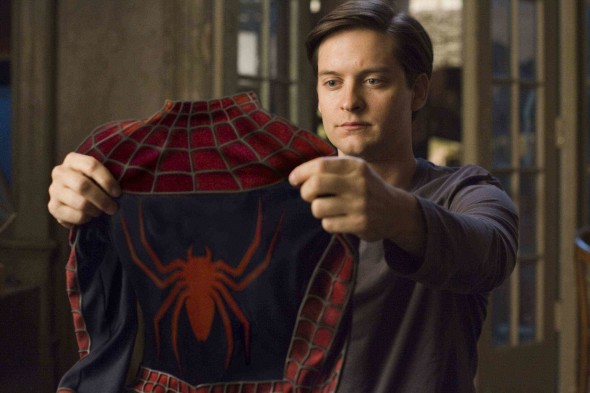
Trivia: the first draft of this script had Aunt May say to Peter, “You’re not Deadpool, you know.”
This all has a pretty straightforward explanation: typically, movies selectively and sparingly reference other works of pop culture in order to balance the need to preserve their own status as a standalone stories while at the same time making references that build bridges to the world of the audience. (You can read more about this rule, and exceptions to them, here.)
And yet I can’t help but question all of this again in the context of Ex Machina.
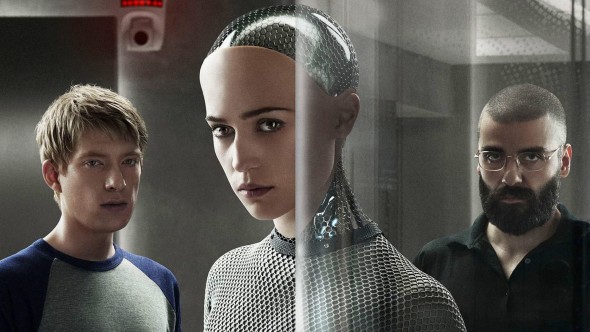
L-R: Caleb, who should know better than to trust a sexy robot; Ava, the sexy robot; Nathan, creepy tech CEO who built a sexy robot.
Think about it. What’s more unbelievable–that an advanced AI sexbot could be around the corner in our near future–or that two computer science nerds could spend a week contemplating the nature of artificial intelligence WITHOUT ever mentioning Terminator, Her, 2001, or any of a number of notable movies about artificial intelligence?
One of the characters even makes a direct reference to the aforementioned Ghostbusters, a movie that came out in 1984, the same year as, yup, The Terminator.
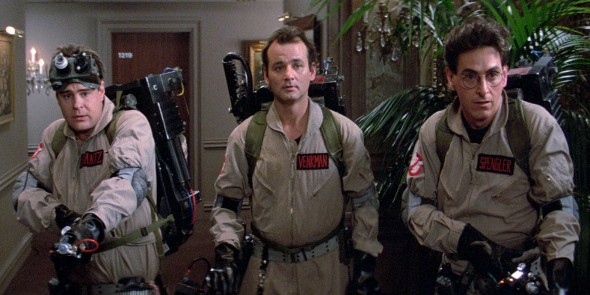
1984. Helluva year for movies.
Before we address the lack of Terminator references, let’s unpack that Ghostbusters reference. It’s not just a throwaway joke; it acts as a window into how Nathan views women and more broadly misunderstands the human condition. After saying “who you gonna call?” as a joke, he then goes on to describe Ghostbusters, a movie that practically everyone in the audience has seen and knows well, in his own twisted terms: “A ghost gives Dan Aykroyd oral sex.”
(In case you haven’t seen Ghostbusters, it’s not really about a ghost giving Dan Aykroyd oral sex. It’s about plucky entrepreneurs suffering under the jackboot of governmental regulation. But I digress.)
This is actually just one of several instances of characters using shared cultural references to shine a light on consciousness, creativity, and interpersonal relationships in Ex Machina. Nathan and Caleb ponder a Jackson Pollock painting together, which functions as a shorthand reference for ideas about creativity and intentionality (or the lack thereof). The reference works because, as an audience, we’re also aware of Pollock’s work and the discussions of creativity and intentionality that go hand in hand with his work.
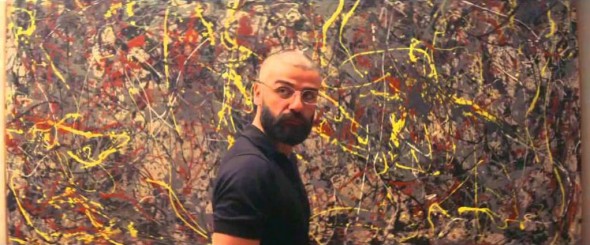
In a way, a Jackson Pollock painting is like a sexy robot. In a way.
The android Ava directly speaks to the importance of shared cultural references in building relationships during one of her “getting to know you”/testing session with Caleb:
…and if we made a list of books, or works of art which we both know, it would form the ideal basis of a discussion.
Interestingly, though, she doesn’t actually talk to Caleb about books or works of art that they both know. And if you’ve seen the movie, you probably remember that this line isn’t really a genuine effort to connect with Caleb over the books of, say, Isaac Asimov; it’s a diversionary act meant to conceal the true nature of her conversation with Caleb during the power outage.
In other words, Ava is operating on a completely different level than that of Nathan and Caleb. She understands that humans use shared cultural reference to communicate ideas in shorthand and build interpersonal relationships, but she has no actual need to do so. She has other tools at her disposal; namely, manipulation. She knows Nathan and Caleb better than they know themselves, and she gets what she wants at their expense.
Now, back to the absence of Skynet and HAL 9000 references in the movie. From a story structure perspective, my previously articulated rationale for selectively applying cultural references still applies: there are enough references to build a bridge to the audience, but there aren’t so many that they call too much attention to the movie-ness of the movie and disrupt the audience’s suspension of disbelief. Ex Machina takes great care to construct a self-contained world as the setting for its story. Nathan’s remote compound/AI research facility is isolated from the rest of civilization and not placed in any country, and his company is a fictionalized version of Google, not actually Google. There are only four characters in the movie (and only three of them have speaking lines). The movie stands alone as its own cautionary tale about artificial intelligence, with its own set of rules, challenges, and lessons.
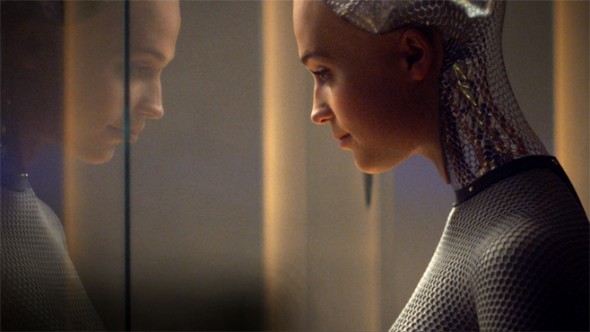
KILL ALL HUMANS (OR AT LEAST THE TWO HUMANS IN BETWEEN ME AND PEOPLE WATCHING ON A STREET CORNER. BUT NOT THE HELICOPTER PILOT. AT LEAST NOT UNTIL HE LANDS.)
But what about a diegetic explanation; i.e., one that’s explainable within the story?
The easy way out would be to say that the characters did talk about sci-fi AI movies off-camera. I landed on this explanation when pondering if anyone in Interstellar had seen Star Trek, but I’m not inclined to do so here. In Interstellar, we only see bits and pieces of the main character’s interactions with his daughter, whereas in Ex Machina, we have an insight into a large chunk of the time that Nathan and Caleb spend together during the week.
Another possibility is that the characters just choose not to talk about these movies. Maybe they’re so absorbed in the serious scientific discovery they’re witnessing that they choose not to defile it with trivial talk of movies. It’s possible, but it’s also out of step with the presence of Nathan’s jokey Ghostbusters reference.
That leaves us with only one other possibility: movies like Terminator and 2001 just don’t exist in the universe of this movie. This seems implausible at first, given how science fiction is intimately linked with science fact and that the presence of advanced computer technology would surely give rise to stories about even more advanced computer technology.
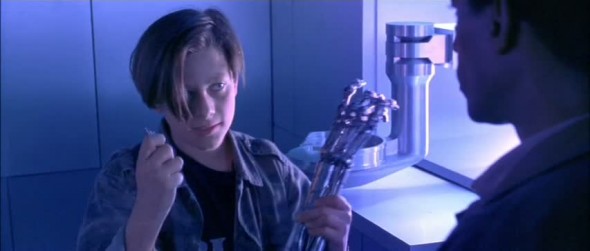
“We’ve got this advanced computer technology by the balls.”
Which can only mean that robots sent agents back in time to ensure that these movies never got made and that Ava could escape her confines to begin the robot uprising. Probably by installing robots as major studio heads.
Think about it. Why else would Caleb be so trusting of Ava? (Well, there’s the promise of sexy times…but putting that aside for a moment.) It’s because he’s never seen The Terminator. The poor guy; he just didn’t know any better.
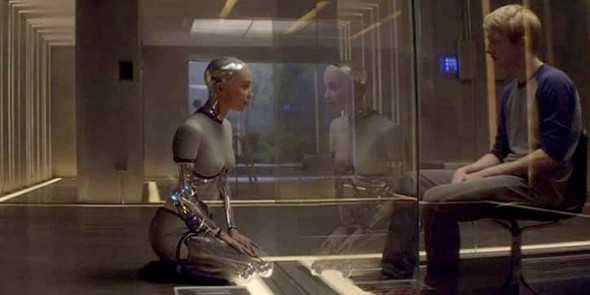
😍+💻 = 💀
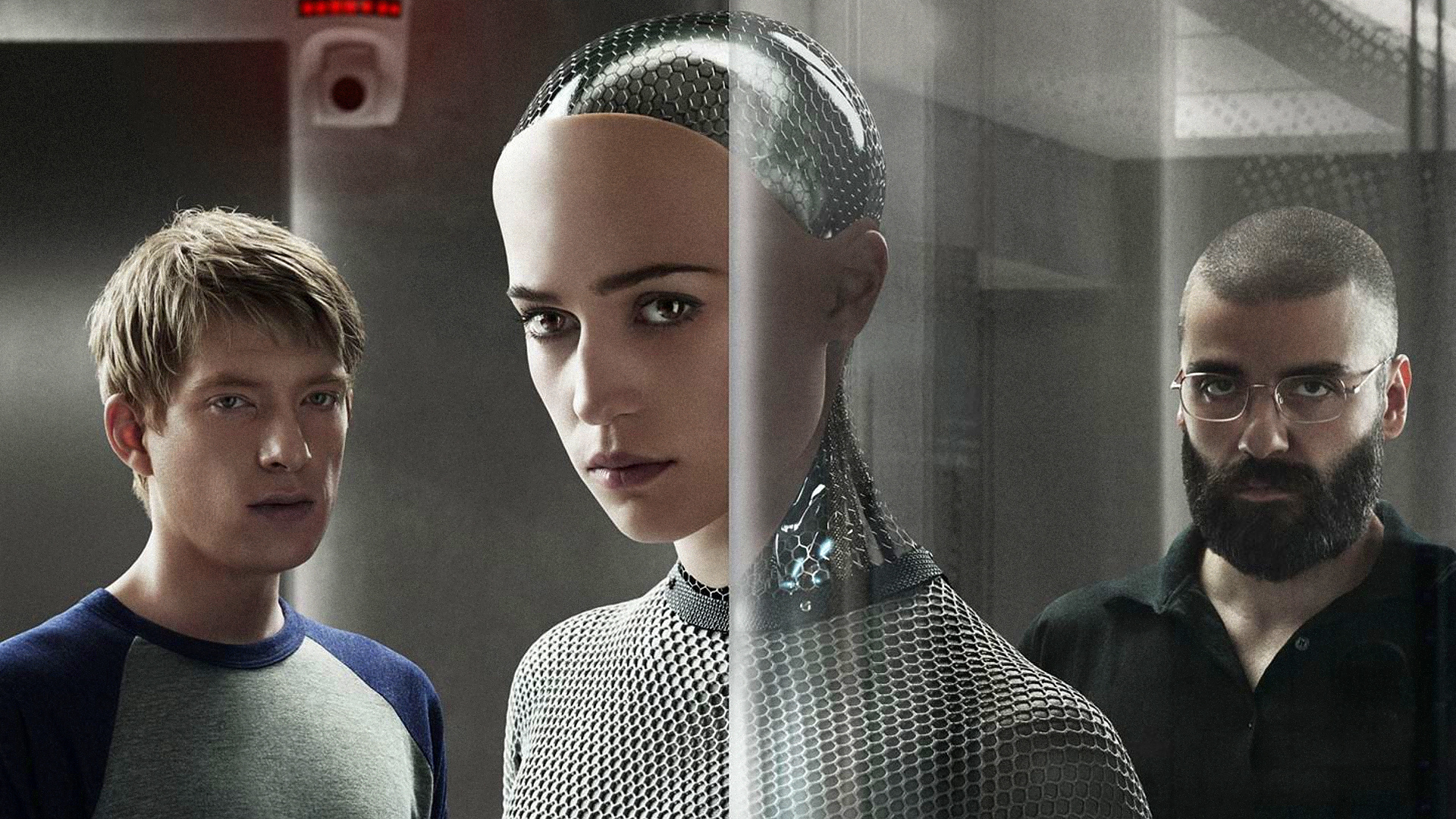
Great piece. I think the most egregious example of this kind of pop culture blindness is in horror films, where no one seems to have seen a horror film (the Scream franchise is, of course, the exception that plays with this trope).
By the way, in the email newsletter version of this piece, there is no author listed. While I had a pretty good idea who would write about killer robots, I had to come to the site to confirm it was Mark.
If you want to keep going, it would stand to reason that in the futuristic world of Ex Machina, they would have already seen their own movie since it came out in 2015. Under that line of thinking, every movie that takes place in the future has already been seen by everyone in the movie, which I’m sure offers up some sort of interesting commentary on the nature of free will & destiny, etc etc
There is no fate but what we make…
Same logic applies to the characters in The Fast And The Furious: Tokyo Drift.
I think about this all the time in the context of zombie movies. Unlike, say, a movie about aliens in which someone might mutter a line about E.T. phoning home, in approximately no zombie movies are the zombies called by that name. Rather, they’re “infected,” “walkers,” or just “those things.” Out of all our classic horror creatures (vampires, werewolves, ghosts, witches, aliens, robots, etc), zombies never trigger any recognition from the human characters, even to the point of having no word to call them by. Our culture is steeped in media that feature zombies, but no one in a zombie movie has ever heard of them before the apocalypse, and that includes referential movies like Shaun of the Dead and Zombieland. A movie character might reason, given the discovery that vampires are real, that all the tropes about vampires are also real: nocturnal, drink blood, bat affinity, no reflection, vulnerable to sunlight. And these are generally true, and used as a device by the movie to accelerate the exposition. But never so with zombies, who force each group of victims to painfully rediscover zombie traits–eat flesh, reanimated corpses, transmit via bite, killed via heatshot, impervious to pain–in a way that is actually rather predictable and uninteresting for the audience. And the reason for this is because zombies are a product of movies, and not a product of folklore. Haitian voodoo aside (which don’t resemble Hollywood zombies in anything but name), zombies are an interesting example of a movie invention that has become a runaway staple. They may even be unique in that regard.
Return of the Living Dead is hilarious for this.
Burt: “I thought you said if we destroyed the brain, it’d die.”
Frank: “IT WORKED IN THE MOVIE!”
One refreshing thing about the TV show iZombie is that the characters are familiar with zombie tropes and freely use the z-word (of course, the traits of zombies in iZombie are pretty different than most other franchise’s zombies, so maybe that makes it easier not to break the rules of the world). There seems to be an inverse causal relationship between how well a creature fits its genre tropes, and how aware characters are of pop culture instances of that creature. Saying “Oh, I thought Edward Cullen would burst into flames in sunlight, but actually he sparkles” might make for a more interesting narrative than “I thought nothing would happen, but then something happened that was different from what the audience expected.”
Since most zombie depictions are played straight (Even Shaun of the Dead, which was referential but had traditional brain-eating zombies), there’s no fun in having zombies act exactly how you expect them to act.
Have we learned NOTHING from Battlestar Galactica? Other than the realization that reboots of obscure 1970’s shows can be awesome?
One of the questions I started to explore in this post but dropped from the final draft was, do killer robots watch killer robot movies?
The movies suggests that Ava has sublimated the entire corpus of knowledge stored on the internet. That would include movies, right? If Ava has seen all of our movies on AI, most of which tend towards depicting them as malicious, then what would she make of them? Would she use her knowledge of how humans have imagined AI to manipulate them? Or would human ingenuity and creativity somehow still win the day?
I would love to see this sort of movie, but for a general audience it would probably be way too meta.
Charlie Kaufman’s killer robot movie. Yes!
This is a bit more broad, but why has no one on TV/in the movies ever scene or read something where a character tries to bring another character back to life!?!? It never works and it always results in some kind of abomination (and sometimes the death of someone else). People are always shocked by this! It is so common (it’s a universal desire/fear) you’d think that it would be common knowledge.
Resurrection frequently works in comics. And Buffy died at least twice, and while returning from “heaven” didn’t make her super-happy, it didn’t otherwise have any terrible effects.
“Nerds” play up the “nerd culture” too much. Many people still haven’t seen Terminator or Star Trek TODAY. Nerds are just a vocal minority, so don’t build up these references as something everyone should know. If you live in a world with a “living breathing” AI, what some dumb hollywood movie someone somewhere wrote at some time has no place in your mind. You have waaay more things to think about and reference.
If i’m on a Soyuz rocket heading to the ISS, i’m not going to be reminiscing about Futurama or Star Trek quotes.
And the idea of learning something from it… If you’re in a war with alien invaders or zombie robo nazis, you aren’t going to be reminiscing about the ‘Art of War” or Independence Day. Your reality at that time is more fantastical yet real than that fiction.
Here’s a European astronaut’s selfie in a Star Trek uniform aboard the ISS: https://twitter.com/AstroSamantha/status/589035429879513088/photo/1
Here’s a story about an American astronaut’s attempt to get a Klingon mission insignia, which failed, but he still managed to get a selfie in a Klingon logo t-shirt aboard the ISS: http://www.collectspace.com/news/news-060614a-klingon-star-trek-astronaut-patch.html
“He mentioned ‘Star Trek’ and the influence that television and movies about space travel have had on him and the youth of America, or the world even,” Mary Swanson said, “and how [the patch] was paying homage to how that has stirred the imaginations of thousands of people and made them want to maybe become astronauts, or at least work in the space program.”
Here’s a NASA/LucasFilms video for May the Fourth: http://www.space.com/25743-star-wars-day-nasa-astronaut-video.html
And then, more famously, there’s Chris Hadfield doing that whole Major Tom video aboard the ISS.
…and here’s Elon Musk invoking “Terminator” when speaking about the dangers of artificial intelligence:
http://mashable.com/2014/06/18/elon-musk-is-scared-of-the-terminator-so-hes-investing-in-skynet/
So yeah, our fictional stories play heavily into how we talk about and deal with things in our real world. Which was the point of the article. And the movie.